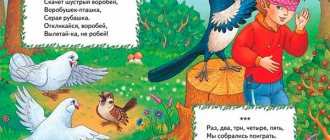Are children going to kindergartens in Moscow 01/10/2021 (01/11/2021) - latest main news
On December 29, 2020, Moscow Mayor Sergei Sobyanin signed another Decree No. 127-UM on extending the holidays for capital schoolchildren from grades 1 to 11 until January 17, 2022 inclusive. The document does not say anything about preschool education institutions, so children can go to kindergartens in Moscow after January 10, 2022, that is, from Monday January 11, 2022. Read below for details.
The document states that, firstly, for students of educational organizations providing primary general, basic general, secondary general education, secondary vocational education, additional education, carrying out sports training, the functions and powers of the founder of which are carried out by the executive authorities of the city of Moscow, with From January 11, 2022 to January 17, 2022 inclusive, the holidays are extended. Secondly, the possibility of using social cards issued on the basis of decisions of the executive authorities of the city of Moscow (organizations authorized by them) for preferential and free travel on the transport application of social cards continues to be suspended until January 17, 2021 inclusive. And in his personal blog, Sergei Sobyanin wrote: “We made the following decisions. 1) Winter holidays in city schools from grades 1 to 11 are extended by a week - until January 17, 2021 2) Along with schools, colleges, institutions of additional education for children and sports schools subordinate to the Moscow Government are going on long holidays. 3) Non-state educational institutions are recommended to make similar decisions. 4) There will be no distance learning during the holidays. However, children can repeat what they have covered and, if they wish, study new material with the help of the Moscow Electronic School.” At the same time, the Minister of Education of the Russian Federation Sergei Kravtsov, in an interview with Rossiyskaya Gazeta, when asked whether all schoolchildren will go to school in January 2022, answered: “we (the Ministry of Education of Russia - ed.) will try to do everything to children returned to school, studied in a full-time traditional format.” We actively interact with educational authorities in Moscow and other regions. In general, today there is an understanding that if the situation does not worsen, schools for high school students will open full-time after the winter holidays. And not only in Moscow, but also in the Rostov region and other regions. We hope so. But everything will depend on the epidemiological situation,” the Minister said. Sergey Kravtsov also clarified the nuances of the bill on distance learning in Russia, which is currently under consideration in the State Duma of the Federal Assembly of the Russian Federation. "Will explain. This bill, without introducing anything fundamentally new, systematizes those norms that partly already existed before, clearly defining powers, helping educational authorities and schools with the procedure. The bottom line is that if, for objective reasons, a subject of the Russian Federation decides to temporarily transfer schools to distance learning (this could be the flu, coronavirus or another threat to the health of schoolchildren), then we need a modern regulatory framework: how to organize this format, how grades will be given how the development of this or that material will proceed, regulation. The new bill divides the powers of the Ministry of Education and Science and the Ministry of Education to establish this procedure for schools and universities. But it does not mean leaving traditional classes in schools! A lively dialogue between a teacher and a student is the basis of our education, the basis of the educational programs that we are actively deploying now in all schools, and this remains unchanged.” This information applies to residents of all regions of Russia: Adygea, Altai, Bashkiria, Buryatia, Dagestan, Ingushetia, KBR, Kalmykia, Karachay-Cherkessia, Karelia, KOMI, Crimea, Mari El, Mordovia, Sakha (Yakutia), North Ossetia (Alania), Tatarstan, TUVA, Udmurtia, Khakassia, Chechnya, Chuvashia, Altai Territory, Transbaikal Territory, Kamchatka Territory, Krasnodar Territory, Krasnoyarsk Territory, Perm Territory, Primorsky Territory, Stavropol Territory, Khabarovsk Territory, Amur Region, Astrakhan Region, Arkhangelsk Region, Belgorod Region, Bryansk region, Vladimir region, Volgograd region, Vologda region, Voronezh region, Ivanovo region, Irkutsk region, Kaliningrad region, Kaluga region, Kemerovo region, Kirov region, Kostroma region, Kurgan region, Kursk region, Leningrad region, Lipetsk region, Magadan region, Moscow region, Murmansk region, Nizhny Novgorod region, Novgorod region, Novosibirsk region, Omsk region, Orenburg region, Oryol region, Penza region, Pskov region, Rostov region, Ryazan region, Samara region, Saratov region, Sakhalin region, Sverdlovsk region, Smolensk region , Tambov region, Tver region, Tomsk region, Tula region, Tyumen region, Ulyanovsk region, Chelyabinsk region, Yaroslavl region, federal cities - Moscow, St. Petersburg, Sevastopol, Jewish Autonomous Okrug, Khanty-Mansi Autonomous Okrug, Yamal-Nenets Autonomous Okrug, Nenets and Chukotka Autonomous Okrug.
30.12.2020 12:53



